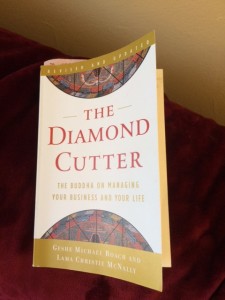Have you ever listened to a friend and thought “Can she even hear herself?” We all have patterns of communication, and behavior for that matter, we don’t notice.
I remember one day my daughter said to me, “Mom, you’ve said that before, several times.” Many of you know when I was 14 years old I had an accident that resulted in a Near Death Experience with head injuries. As a result of this I have experienced some memory problems. Another result of this trauma was I lost my sense of smell, which also influences memory. A positive from the accident is a definite increase in my intuition. When my brain was injured, my intuitive self took over and now much of how I access information is intuitively.
Unless we continually challenge our brain, we can develop memory lapses. Since my daughter’s comment, I have been working on being aware and not repeating myself. Repeating can happen for reasons other than memory problems and brain injury. When one has a history of not being heard, not being listened to by others, they can develop a pattern of repeating. Saying the same thing over and over again can also come from a lack of self-awareness. It can also be an ineffective way of trying to heal an emotional wound. You may say the same thing over and over but nothing changes. It would be more effective to change your behavior by accepting a situation or changing your relationship with the problem; forgiving, leaving, setting boundaries and such. Saying the same thing over and over can also be a sign of ADD.
Have you ever had a conversation with a friend, loved one or a co-worker who often repeated the same thing and didn’t focus. Someone with whom you tried to create a plan, but politely getting them to pay attention, listen and commit to a time was near impossible? Instead they just kept telling you all the situations that went on in their day and you were not able to set a meeting.
So, how to do you communicate with friends, loved ones and co-workers that are ADD or have ADD
symptoms?
Listed here are some of the Inattentive Symptoms of ADD; not the Hyperactive Symptoms. This may help you to identify why you’ve had some difficulty communicating with someone. It can clarify why you may have felt frustrated and hopefully will give you some helpful communication solutions for yourself.
Inattentive ADD Symptoms
- Careless mistakes/lack of attention to details
- Lack of sustained attention
- Poor listener
- Failure to follow through on tasks
- Poor organization
- Forgetful in daily activities
- Avoiding tasks requiring sustained mental effort
- Losing things
- Easily distracted
Depending upon how close you are to this person, you may want to research more about ADD and continue to learn.
Here are some simple ideas that may help.
- Use emails as your primary form of communication to set up meetings. This way you can scan the email quickly for the details about the meeting.
- Start your conversation with, “I have one minute to plan this meeting.”
- When the person becomes tangential, politely bring them back to topic. “Oh, I’m sorry, I
have to go, when did you say you could meet?” - Give the person 3 clear choices of times.
- Be willing to set a boundary.
- If the person won’t be decisive, realize the meeting may not happen and move on.
- Plan your communication with the person when you have enough time to go through the
process to get the meeting planned. - Have a plan B for your time so if their disorganization creates a last minute cancelation, it
won’t disrupt your life.
These are some ideas that may be helpful. Again, if this is someone you live with or a supervisor, I encourage you to find more information on this topic. One book you may be interested in What Does Everybody Else Know That I Don’t?: Social Skills Help for Adults with Attention Deficit/Hyperactivity Disorder by Michele Novotni, PhD





